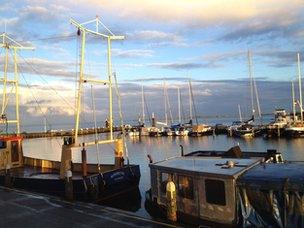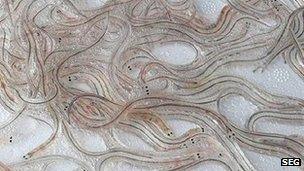Netherlands fisheries: The vanishing eels of Volendam
- Published
Fisherman Jaap Bond: 'There is no taste like smoked eel'
As the sun sets over the calm waters of the IJsselmeer, north of Amsterdam, holidaymakers crowd into restaurants to eat the local speciality.
The fortunes of the lakeside town of Volendam have been built on the fat and tasty flesh of the eel.
Fisherman Jaap Bond, 61, remembers a time when the eel catch was plentiful.
"It was full of eels here," he says. "In the good times you could catch 1,000 kilos a day."
In his lifetime, Jaap Bond has watched the number of eels in the waters off Volendam dwindle to almost nothing.
Now, in an effort to preserve the eel, the Dutch government only permits fishing for four months of the year.
"They catch the small eels near Spain and France and the coast when they come from the Atlantic," says Mr Bond.
"They take them off to farm them. When the farming started, there were fewer eels. And now here, it's over for fishing."

The fortunes of the lakeside town of Volendam have been built on the eel industry
Some think of the eel as a creepy, slimy creature. Others consider it the best health food in the world.
But whatever your views on the eel, you should not take it for granted.
Research shows that the number of eels in Europe has dropped dramatically and they are now classed as a critically endangered species.
In many European countries, demand for this delicacy remains strong and eels continue to fetch a high price.
A short walk across Volendam is the Smit Bokkum smokery, established in 1856.
Evert Smit is the latest in a long line of men who have made their living gutting and smoking eels.
"This is one of the last traditional smokehouses in Holland," he says.
"The [eel] population has dropped so dramatically in the last five years. What we have in the lake is now only 1% of that 20 years ago."
Although much is known about the European eel, the exact location of its spawning ground in the Sargasso Sea in the North Atlantic remains a mystery.
Baby eels are carried thousands of miles back to Europe on the Gulf Stream. Here they become glass eels and swim into freshwater lakes, where they mature before re-entering the sea to breed.
But pollution, the damming of waterways and overfishing, especially of glass eels off the coast of southern Europe, have all contributed to a sharp decline in eel numbers.
Breeding breakthrough
In Volendam, scientists are attempting to address this issue.
Marine biologist Andries Zwaga runs an eel breeding facility in the town.
He uses hormone injections to mature wild eels in captivity, then harvests eggs and sperm to produce eel larvae.
He says his scientists are working on an implant that will make the maturation process more natural.
He says he is also close to a breakthrough in developing a viable feed for the baby eels.
"In Europe it would be the first time this had been done," says Andries Zwaga.
"Nowhere in Europe have we been able to feed the eel larvae. In Japan they have already managed to feed the eels, but not using a natural product.
"We want to develop a natural feed."
As well as having the potential to increase eel stock, success in breeding and feeding the eels could make the facility a considerable amount of money.
"The prices for glass eels are quite high," says Andries Zwaga.

Pollution, damming of waterways and overfishing have decimated eel numbers
"What I heard in the last couple of months was that prices were as high as $3,000 per kilo. If you know there are 3,000 glass eels in a kilo, then one glass eel is worth $1. So that's a lot of money."
But it is this combination of conservation with profit that has angered the Dutch environmental lobby.
Femke Nagel is the Ocean's campaigner for Greenpeace in Amsterdam.
"It wouldn't take a scientist to understand you shouldn't consume a critically endangered species," she says.
"It's like eating an orang-utan."
Greenpeace says the only way to preserve eels is to stop fishing them altogether.
"The current initiatives taken by the industries are just trying to give a sustainable image to a practice which is basically trying to continue the consumption of a critically endangered species, and it has to stop," says Femke Nagel.
But even if the breeding project is successful, it will take another decade before it can produce enough eels to meet demand.
By then, fisherman like Jaap Bond will have given up their trade and the waters of the IJsselmeer are likely to be empty of eels.
- Published9 November 2010